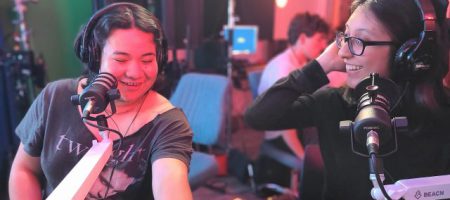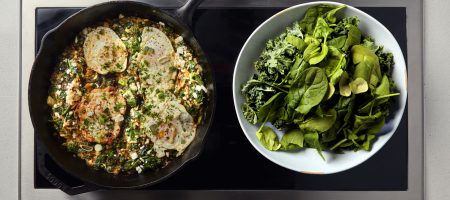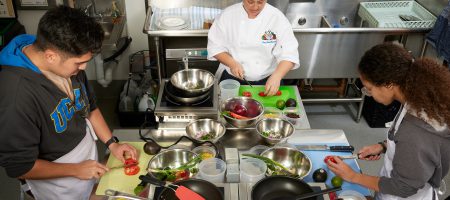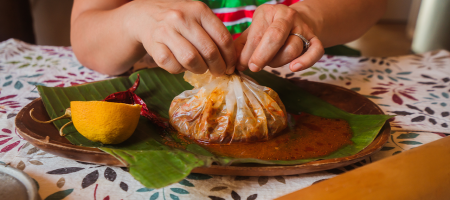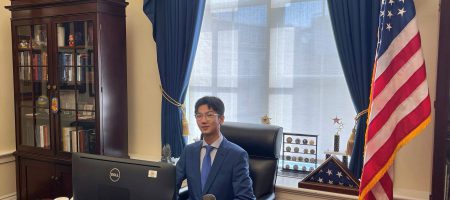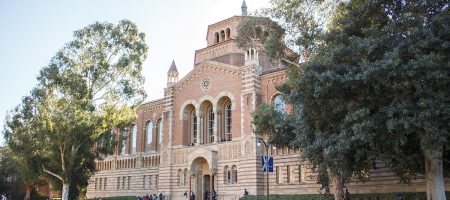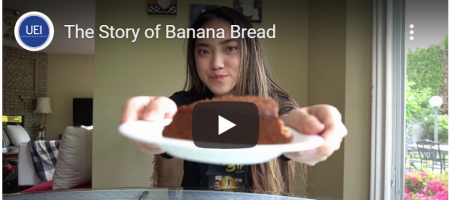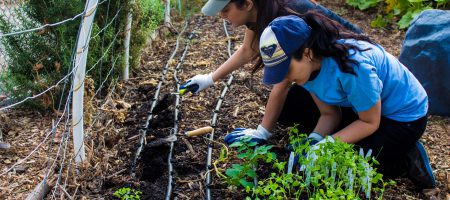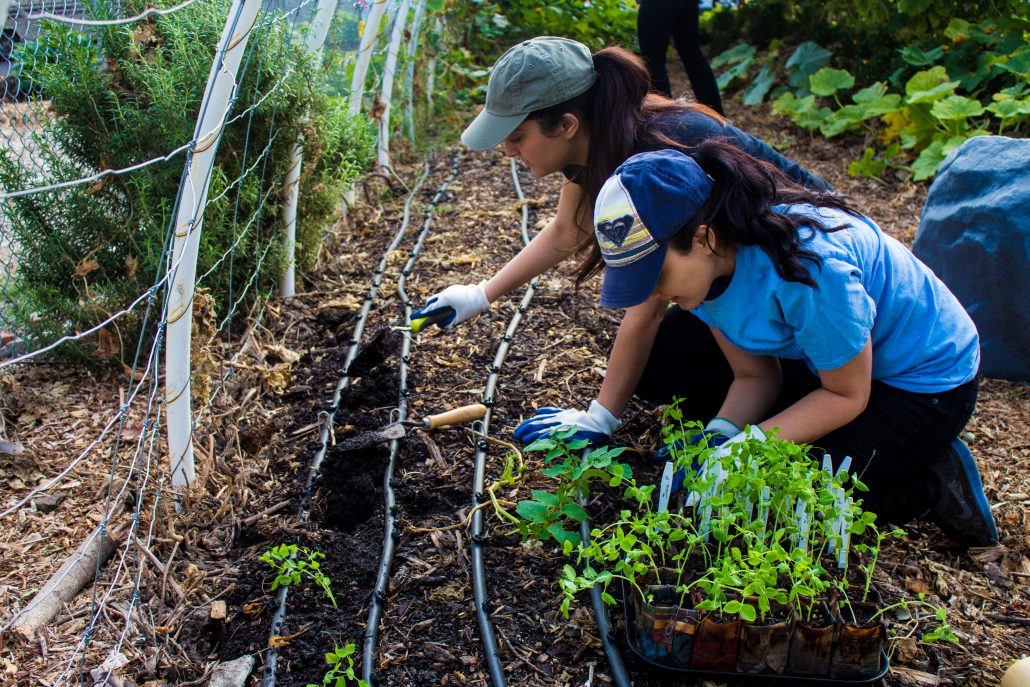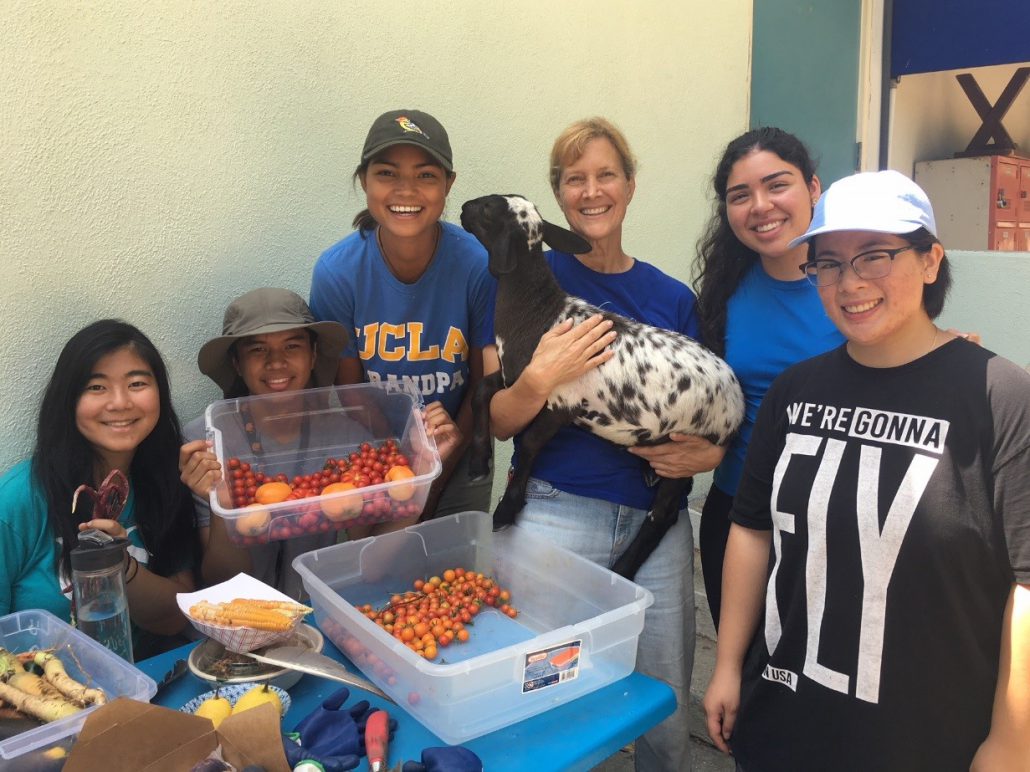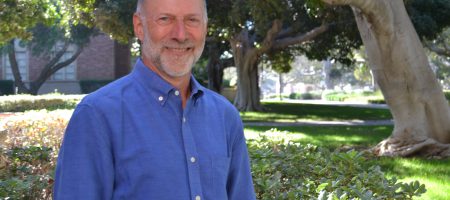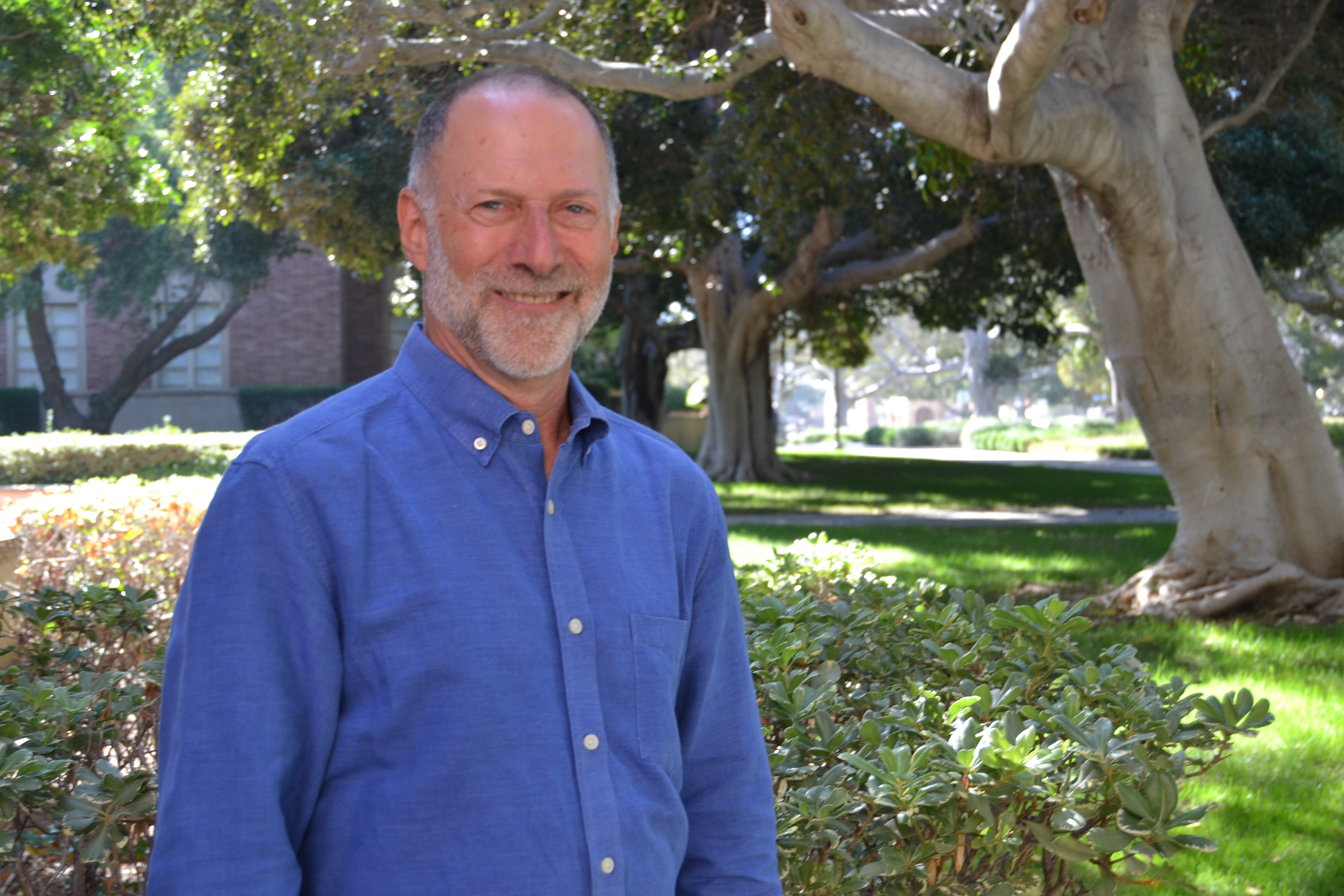Dinner Is Served
/in FS Minor news /by charlotte vo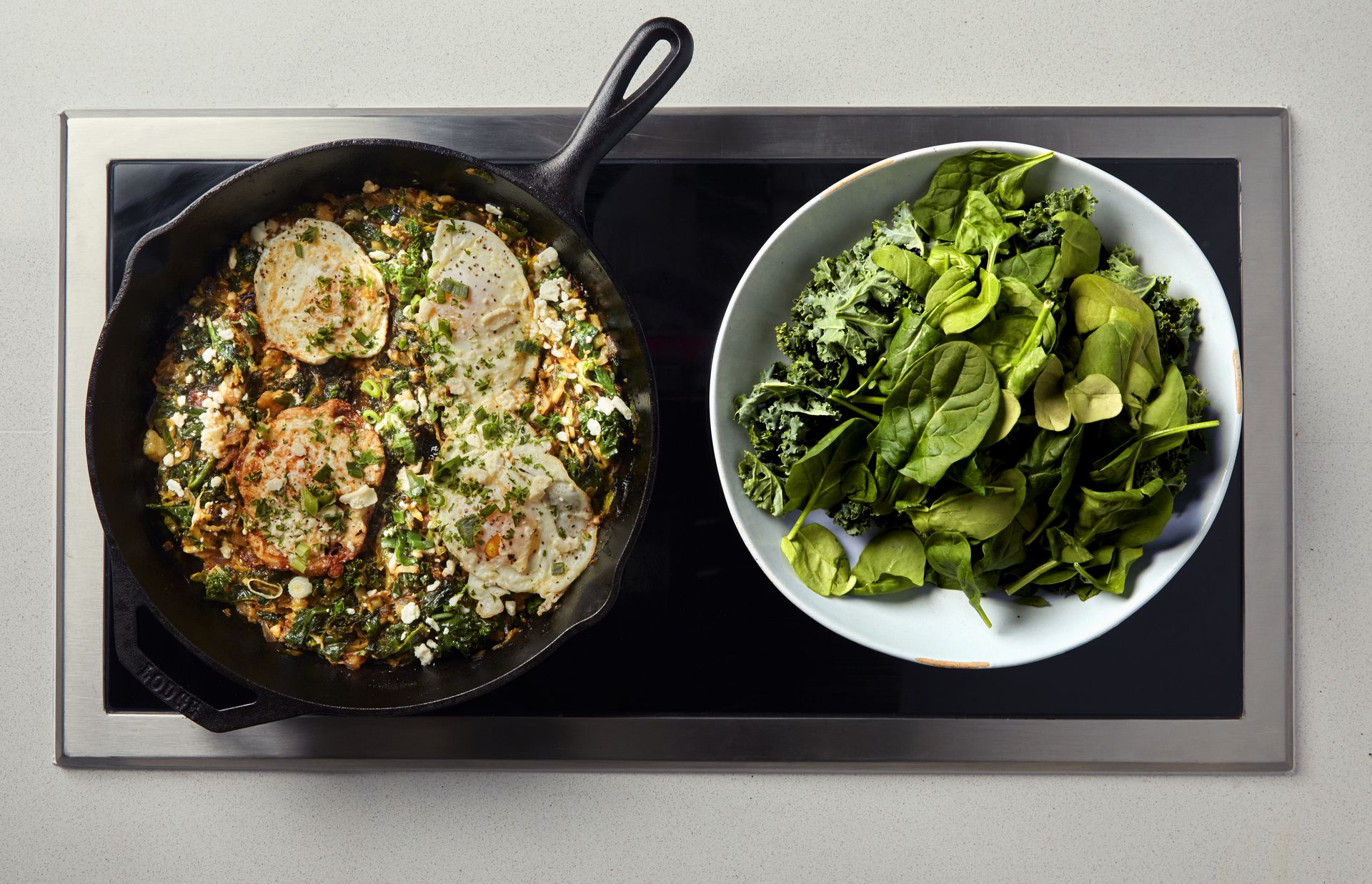
Impress your guests with these three delicious campus recipes — from Bruin Plate and Plateia — at your next soiree.
How to make your next dinner party your best dinner party? Turn to the Bruins wielding the spatulas. Here, three easy-to-make, better-to-eat recipes from the kitchens of our campus’s award-winning eateries. (Worth it for the pictures alone!)
Read more from UCLA Magazine’s Spring 2023 issue.
A Different Kind of Course Work
/in FS Minor news /by charlotte voThe UCLA Teaching Kitchen is part of a whole new campus ecosystem putting Bruin ingenuity to work in the world of food.
Read the original post by Anne Pautler | Photos by Diana Koenigsberg |
It’s five minutes before Culinary Bootcamp even starts and I’ve already made my first mistake.
“Don’t use that sink,” Julia Rhoton, chef and culinary arts coordinator at the UCLA Teaching Kitchen, tells me. I’ve reached for the first faucet I see. But I should be using the small hand-washing sink, not one of the deep, three-compartment commercial kitchen sinks. Chef Julia’s soothing voice is a constant feature of bootcamp. She instructs, she explains, she cautions.
Designed to teach basic knife skills and cooking methods, Culinary Bootcamp — held at a clubhouse in the Los Angeles Tennis Center complex — is a single-session workshop that’s free to students, with all equipment and ingredients provided. Some of the students who enroll are minoring in food studies; others are merely hoping to learn some life skills. All will leave with a free, healthy meal: today, a veggie quesadilla and fresh guacamole.
But the impact of the Teaching Kitchen is much greater than cooking lessons. In this space, health sciences trainees master menus specific to chronic diseases; science students explore the origins of food texture and flavor; and campus groups hold team-building workshops.
The Teaching Kitchen is brightly lit, with no chairs or stools. Chilly stainless steel dominates: the sinks, the shelves, the prep tables. Each student is presented with a neatly folded apron. On this day, bowls — yet more stainless steel — hold a bright still life of vegetables: deep green avocados, zucchini and limes; a fistful of lacy cilantro; half a jalapeño; a quarter each of onion, red pepper and tomato. Thin plastic cutting mats add a patchwork of color, each overlaid with a chef’s knife. Countertop induction burners are shared, with one burner for each pair of students.
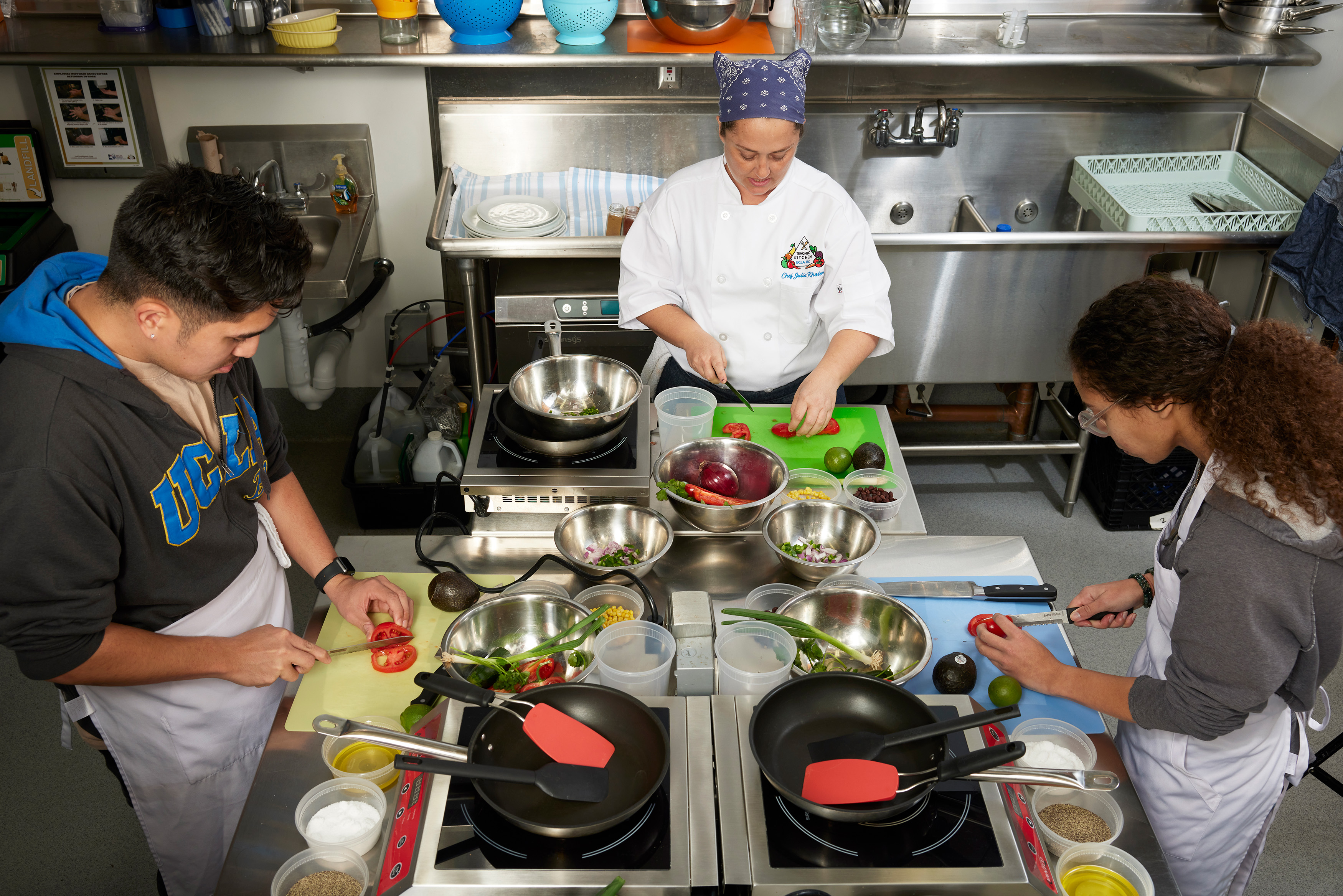
There isn’t much chatter as the six students arrive and don their aprons. Chef Julia looks stripped for action in a simple black T-shirt, her face bare of makeup and dark hair hidden by a neatly tied bandanna. It’s time to get started.
Guacamole first. Chef Julia posts the recipe on an overhead screen. Under her exacting eye, we tentatively pick up our knives.
The workshop is dense with insights, from how to properly grip a cutting knife to how to adapt a recipe for vegans. There’s even a reference to climate impact: the environmental trade-offs between fresh and frozen and local and imported ingredients. I learn a lot right off the bat: Cut a pepper from the inside. For onions, the trick is to leave the root end intact.
As neatly diced vegetables begin to crowd our cutting mats, another student appears. I mentally christen him Late Guy. He becomes my workstation partner.
We use forks to mash our avocados. We add diced tomato, onion, jalapeño and cilantro, to taste. I spill most of the chili powder on my cutting mat.
Chef Julia steps to my workstation, calmly flexes the mat and dumps the chili powder into compost. I’m embarrassed, but her shrug is reassuring, conveying “I’ve seen worse.” I rinse my chili powder-coated hands — in the proper sink.
Making social change through food
Launched in 2017, the Teaching Kitchen is both a place and a concept. UCLA is part of a network, the Teaching Kitchen Collaborative, that uses teaching kitchens as catalysts for change.
Chef Julia is a key player. She earned her culinary degree from the famed Le Cordon Bleu College of Culinary Arts and spent more than 17 years working and learning in Los Angeles kitchens. In 2018, she earned a degree in elementary education, but student teaching taught her something important about her own strengths and limitations. “I couldn’t stop worrying about the children when the school day ended,” she says. “Were they getting enough to eat?”
In 2019, Summer Discovery — an enrichment program that uses UCLA and other college campuses as venues — gave Rhoton a chance to work with older students. There, she came to the attention of UCLA Recreation; she ended up becoming UCLA’s first-ever culinary arts coordinator.
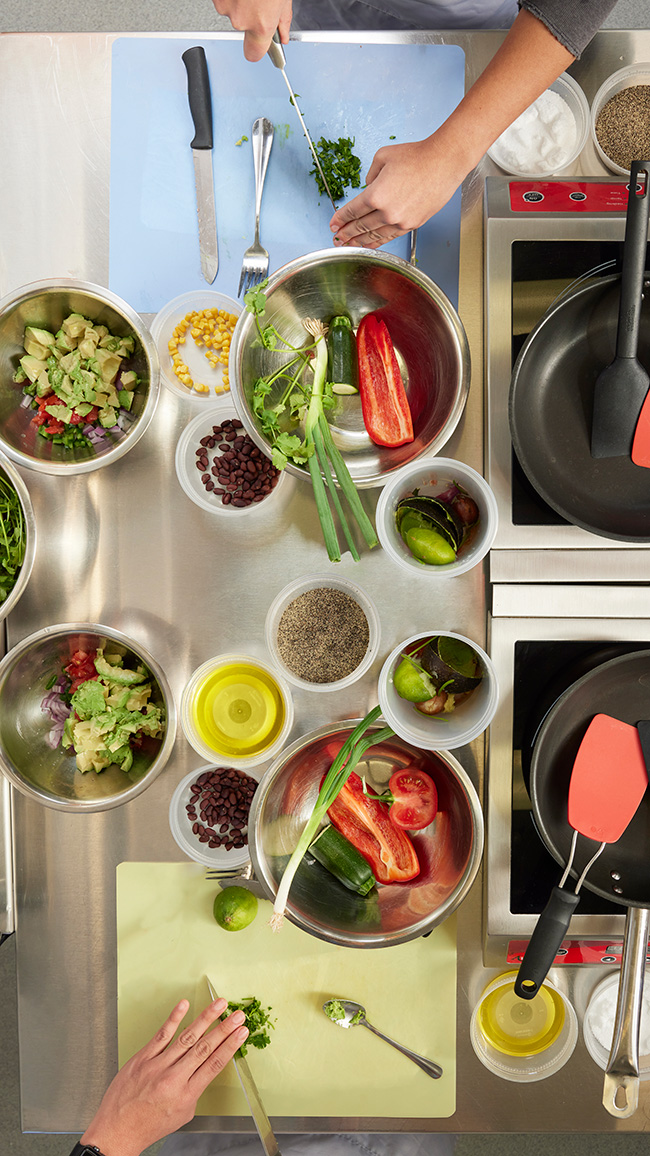
Today, the Teaching Kitchen mixes academic aspirations, student desires and administrative know-how in a creative, innovative blend. In 2014, Wendelin Slusser, associate vice provost for the Semel Healthy Campus Initiative at UCLA, convened a “Food Summit” on campus to brainstorm a vision for nurturing a world-class food studies program. More than 60 campus decision-makers — academics, administrators and student leaders — gathered to hammer out a wish list. “One of the dreams we had was to have a chef,” Slusser recalls. The food studies minor for undergraduates and the food studies certificate program for graduate students were created and approved in little more than a year. UCLA Recreation made space for a community garden at Sunset Canyon and offered the staging kitchen in the LA Tennis Center as a home for the Teaching Kitchen.
A UCLA food collaborative was born.
Learning is on the menu
Multiple campus departments pooled money to transform the catering prep kitchen into a culinary kitchen. Like many remodels, the project ran over budget. Alumna Marcie Rothman ’68, known on radio and TV as “The $5 Chef,” came to the rescue with the needed funds — and an enduring commitment to food studies at UCLA.
The completed Teaching Kitchen is a triumph of cross-campus cooperation. Slusser is proud that so many campus entities contributed, from her own Semel Healthy Campus Initiative to Recreation, the Community Programs Office, the College of Letters and Science and the David Geffen School of Medicine. “Our role is to open the doors and windows and silo-bust,” Slusser says, “so we can create a learning community that will better our own campus and beyond.”
Bruin Plate has the cuisine students want to know — and eat — better. Read the story.
UCLA biophysicist Amy Rowat was teaching “Science and Food: Physical and Molecular Origins of What We Eat” before a Teaching Kitchen was even dreamed of. She’s not nostalgic for those early days of searching for science classrooms uncontaminated by chemicals and improvising with hot plates, toaster ovens and extension cords. Now the Teaching Kitchen is the course’s laboratory, used by guest chefs and students alike. It’s not easy (read: it involves physics and math), but most students thrive in an atmosphere enhanced by guest chefs. The course typically ends in a “scientific bake-off,” where pies or other baked goods demonstrate the scientific whys and hows behind recipes.
Rowat, now UCLA’s Marcie H. Rothman Presidential Professor of Food Studies, taught “Perspectives on Food and Society” in Spring 2022. In that course, students considered broader issues that included climate, human health, health disparities and food access. For Rowat, a highlight of the course was the visit from African American chef Martin Draluck, who cooked over a live fire in the community garden. As they ate his savory rabbit and grits, students were mesmerized by learning about the chefs enslaved by Thomas Jefferson and George Washington. In their course evaluations, students used the word “revelation.” “They learned new ways of thinking about food and how it impacts society,” Rowat says.
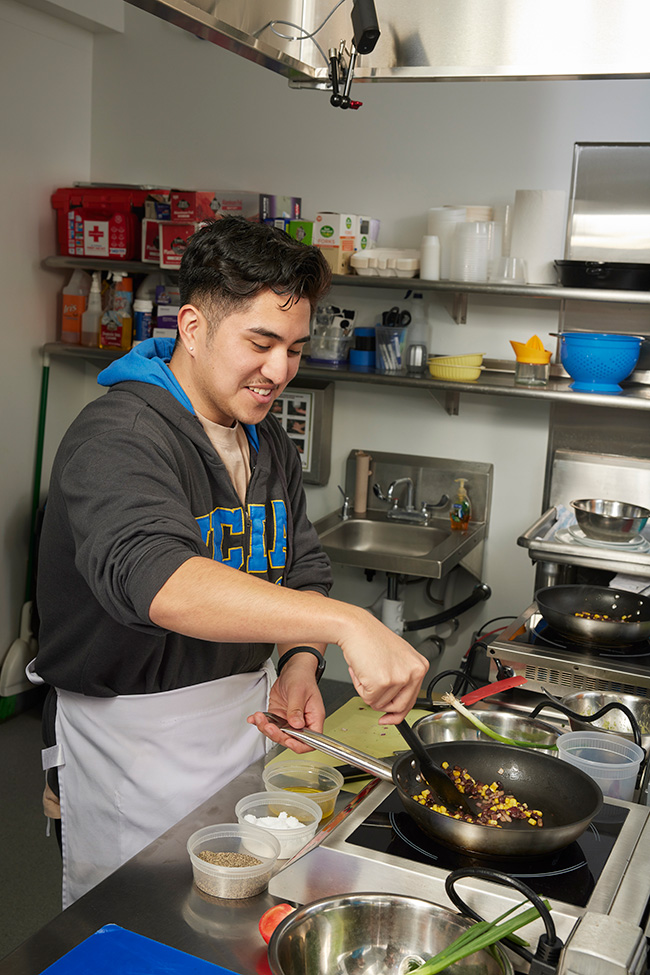
Catherine Carpenter, who teaches nutrition to future health providers, knows that many chronic diseases can be prevented or managed with improved eating habits. When she started using the Teaching Kitchen, her course became a can’t-miss event, engaging and enjoyable. Students pursuing a master’s in nursing choose from sessions pegged to specific diseases such as diabetes, hypertension, atherosclerosis and colon cancer. “If we can provide the students with a lifestyle skill of cooking a healthy meal for lowering the risk of disease,” Carpenter says, “then they can teach their patients. And their patients can teach their families.”
Pilot efforts began in 2018. After the pandemic struck, Carpenter switched to a virtual model. She personally prefers the virtual approach, she says, because people can replicate what they’ve done in their own kitchens, using their own equipment. She’s working on a more polished online version of the course to reach even more health providers.
Cambria Garell was also involved in the pilot program. An associate clinical professor in pediatrics, her major focus is pediatric residents. Most of them, she says, have some working knowledge of cooking. Like Carpenter, Garell believes in a “train the trainer” approach. Health professionals who engage in healthy lifestyles themselves are more likely to counsel patients, and more effective when they do.
A pleasant surprise to Garell was that the Teaching Kitchen experience actually improved the behaviors of the pediatric residents involved — not just their nutrition, but in terms of healthier lifestyles (even including a little more sleep). Garell says, “There’s something about the community-building that happens around cooking together, learning together, delivering these skills to the community … that supports our own wellness as health care providers.”
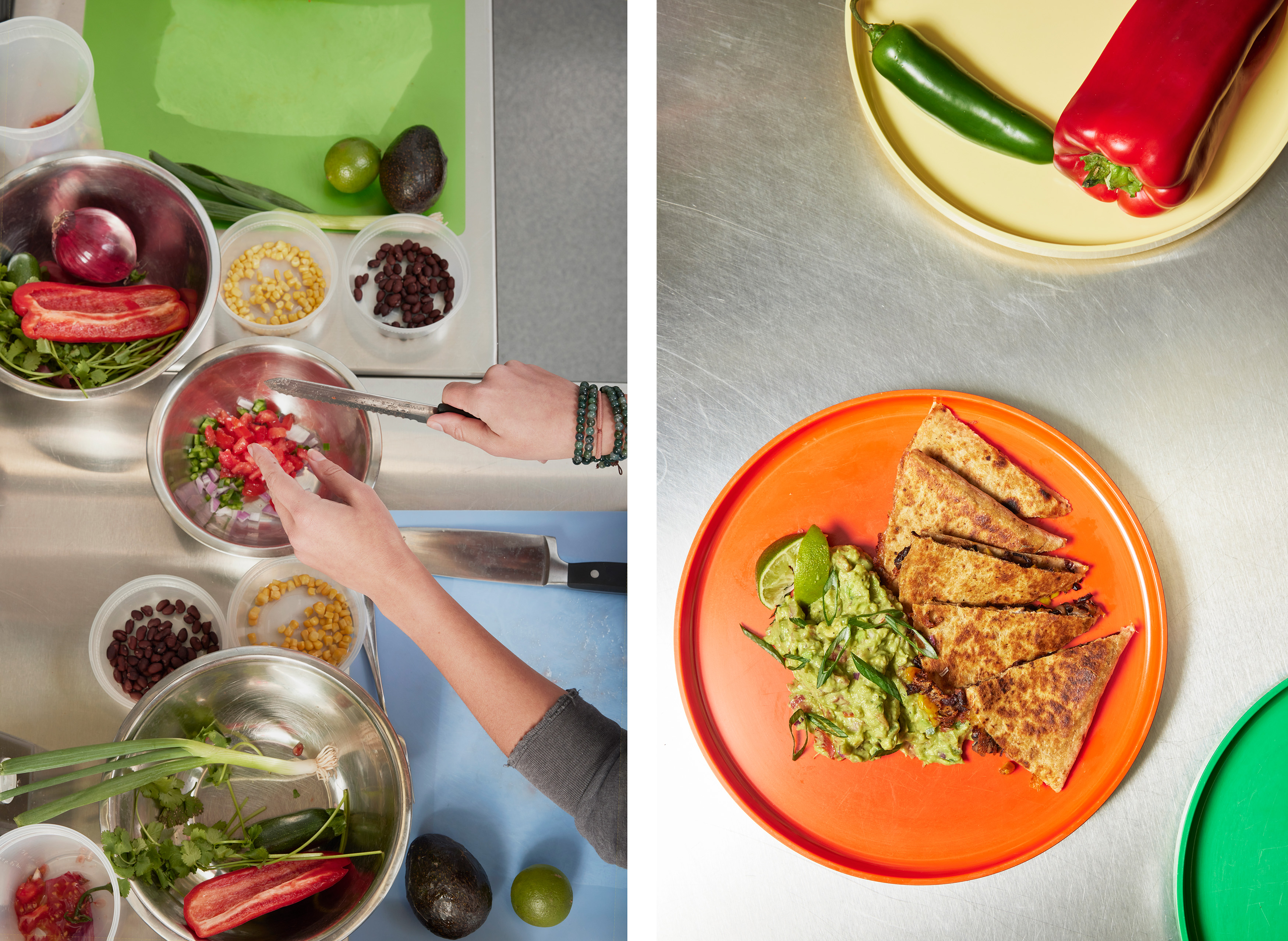
Meanwhile, back at bootcamp …
Late Guy takes charge of our burner as Chef Julia explains the “HAHA” acronym: Heat the pan, Add the oil, Heat the oil, Add the veggies.
Late Guy adjusts our burner to 190 degrees. To our diced zucchini, onion and red pepper, we each add about a quarter-cup of corn and the same amount of black beans.
With the savory, sizzling smell of the cooking vegetables encouraging us, we cover our whole-wheat tortillas with shredded cheese. We layer the cooked veggies over the cheese-topped tortillas, then top with a plain tortilla.
Soon, the whole kitchen smells of fresh-cooked veggies and crisping tortillas. When it’s time to turn the quesadilla over, Chef Julia shows us a trick. She uses her spatula to lift the quesadilla from the pan, then inverts the pan over it and flips quesadilla and pan together. In minutes the second side is brown.
It’s almost the end of class time when I cut my quesadilla in quarters and put it in a container with my guacamole. It turns out Late Guy does not like either guacamole or quesadillas, but Chef Julia persuades him that his roommate might appreciate the free lunch.
Culinary Bootcamp is over, for today, but the Teaching Kitchen is just getting started. Extra teaching space has been added in UCLA’s newly opened Tipuana Apartments, where up to 30 students can be accommodated. Even more important is the establishment of the UCLA Rothman Family Institute for Food Studies, an interdisciplinary institute devoted to research, teaching and policy about food, which now houses the food studies minor and graduate certificate program. A gift of $13.5 million provides ongoing funding for research, curriculum and library resources, including the first endowed food studies librarian at a university, as well as more hands-on experiential learning opportunities and a chef-in-residence program.
UCLA, Chef Julia says, “is uniquely positioned as a leader in food studies.”
And its guac rocks, too.
Global Cuisine: “Abuelita’s Kitchen: Mexican Food Stories”
/in Events FS Minor news /by charlotte vo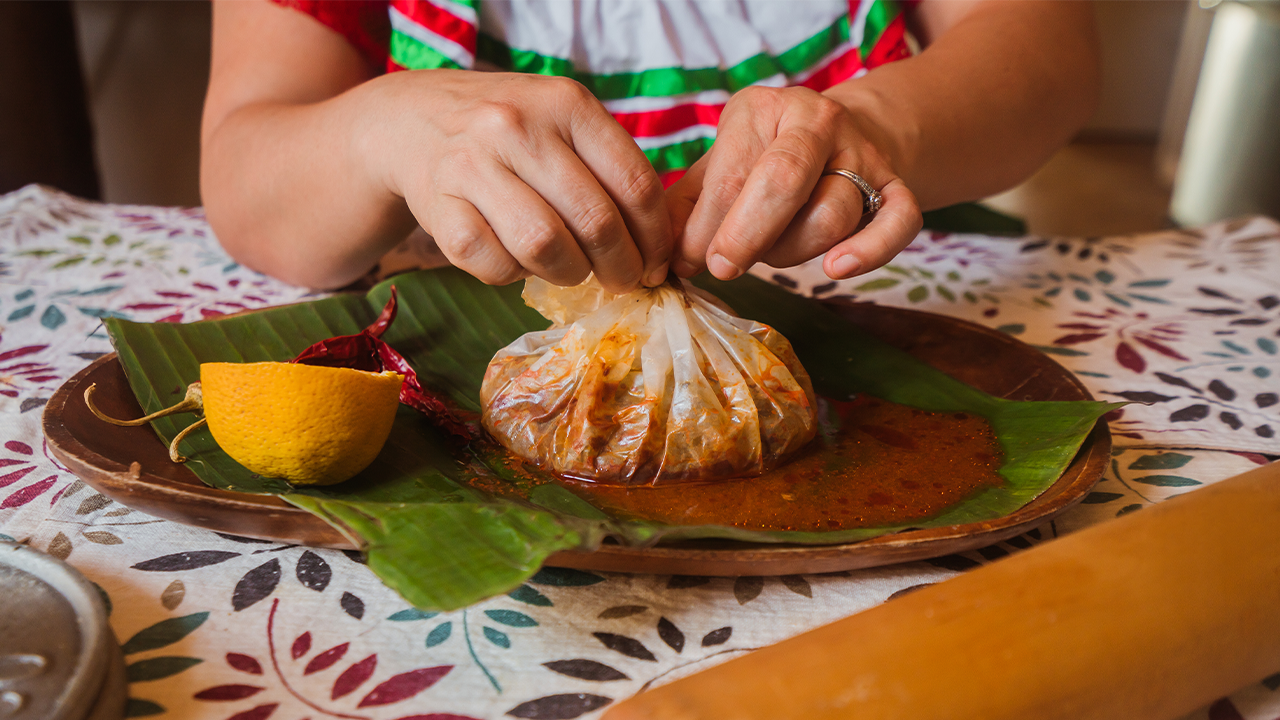
Join the EatWell Pod of the Semel Healthy Campus Initiative Center at UCLA at the Fowler Museum for a screening of Abuelita’s Kitchen: Mexican Food Stories (2022), directed by Ebony Marie Bailey and produced by USC professor of food studies Sarah Portnoy. The documentary shares the food stories of 10 Indigenous, mestiza, Mexican-American, and Afro-Mexican grandmothers in Los Angeles, including their personal journeys as immigrants, and their knowledge of traditional dishes. These grandmothers have cooked, preserved, and passed on Mexican food traditions, while creating communities and cultures unique to Southern California. A post-screening conversation with producer Sarah Portnoy and film participants will follow. Afterward, join us for a tasting of Mexican food and drinks in the Fowler courtyard.
Space is limited for this in-person program. RSVP is required through this link.
This program is presented in partnership with support from the Semel Healthy Campus Initiative Center at UCLA, which is envisioned and supported by Jane and Terry Semel, and with support from the Rothman Family Institute for Food Studies at UCLA.
Parking available in UCLA Lot 4, 198 Westwood Plaza, directly off Sunset Blvd; $3/hr or max $14/day. Rideshare drop-off at 305 Royce Dr.
Image by Jessica Magaña at RedHeart Media
UCLA students and alumni work together to tackle food justice
/in community learning FS Minor Minors news /by rayna jacksonSarina Morales is a self-proclaimed “city girl.” Born and raised in San Fernando Valley, Morales had never worked on a farm, planted her own food, or chased chickens. But all of that changed this summer.
For ten weeks, Morales along with fourteen other UCLA students learned about access and equity issues related to food in Los Angeles through the civic engagement and food studies course, “Food Studies and Food Justice in Los Angeles.”
The service learning course, which was sponsored in part by the UC Global Food Initiative and created by the UCLA Center for Community Learning, paired students with eight different community partners.
Morales, who is a junior, originally came to UCLA with dreams of becoming a doctor. She declared her major in human biology and society, and immediately began completing the required courses for medical school. She always loved the subject of food, but never knew it was something that could actually be studied at a university. So, when her department sent out an email about the class, Morales signed up.
“I was looking for something to do over the summer and the service learning component sounded very interesting,” Morales said. “Plus, the class was paid for by the Food Initiative, so that made it even better!”
Before Morales started working with the community partner Kindred Spirits Care Farm, she expected to do manual labor in the garden, like planting food. However, when she got there, she soon realized that in addition to gardening, she would be caring for goats, geese, pigs, chickens, rabbits and alpacas.
Karen Snook, who is the Kindred Spirits co-founder and executive director, taught Morales how to care for the various rescue animals and even how to corner, catch and clip the nails of a chicken.
“I was nervous, but Karen explained everything,” Morales said. “It’s crazy that that was the first time I had ever held a chicken!”
Dr. James Bassett, instructor with the UCLA Institute of the Environment and Sustainability, taught the course over the summer. For Bassett, the community engagement component is particularly important because students see the subject of food come to life.
“Several partner sites feature community gardens or other growing spaces where students learn how to grow some of their own food,” Bassett said. “These represent great opportunities for students because they explore issues of food and agriculture and literally get their hands dirty.”
At Kindred Spirits, UCLA students work in the animal rescue and sanctuary, permaculture garden or with students from John R. Wooden High School, a continuation high school for at-risk kids, where the farm is located.
Snook takes time with each UCLA student to connect everything back to topics such as social justice, food deserts, food insecurities, and agriculture.
“I want them to walk on the farm and experience the animals and plants,” Snook said. “I want them to work side by side with, and learn from people from the community.”
Snook, who received her B.S. in psychobiology with a specialization in computer science from UCLA, says that working with her alma mater and seeing a new generation of Bruins passionate about food justice gives her the energy to continue her work.
“What I do is hard,” said Snook. “There are plenty of days when I ask myself, ‘Am I making an impact?’ One thing I find incredibly refreshing about working with UCLA students is that they give me a sense that ‘Yes, I am doing is the right stuff and I do have an impact.’”
Bassett may work in the classroom with students, but he feels the same way as Snook.
“I was an undergraduate at UCLA,” said Bassett, who received his B.A. in psychology. “And this has given me another chance to give back. I am very grateful to have the opportunity to help connect students with our community partners and to the possibilities that lay in their future.”
Morales says that the time she spent in class with Bassett and working with Snook at the farm exceeded her expectations. She also credits her hands-on experience with for fueling her passion for food studies.
She recently switched her major to environmental science with a minor in food studies. Now, Morales looks to do advocacy work by starting grassroots food and health movements in local low-income communities.
“This class has showed me that I can go beyond UCLA to do this work,” Morales said. “I can be successful and change the world.”
Community Learning: You See L.A. Abroad: If the world’s interesting, LA is more so. UCLA needs to help Bruins explore it.
/in community learning Featured Stories news /by administrator(Daily Bruin | October 4, 2018)
Shalom Staub named director of UCLA Center for Community Learning
/in community learning news /by rayna jacksonFollowing a national search, Shalom Staub has been selected as director of the UCLA Center for Community Learning, effective September 1.
In an announcement to Undergraduate Education, Dean and Vice Provost of Undergraduate Education Patricia Turner said that Staub will “engage undergraduates, faculty, administrative colleagues, and community partners to expand and enrich community-engaged learning, internships, and other community-based curricula, integrating the teaching, research, and service interests of faculty with the needs and priorities of community partners.”
Prior to UCLA, Staub served as Associate Provost for Academic Affairs and Civic Engagement at Dickinson College in Carlisle, Pennsylvania, where he spearheaded the college’s community engagement initiatives across multiple divisions and coordinated the college’s broader civic learning and community engagement programs. While at Dickinson, Staub was also a contributing faculty member to the departments of Sociology, Religion, Judaic Studies, Middle East Studies, and Social Innovation and Entrepreneurship. An accomplished mediator, he also led Dickinson’s Conflict Resolution Resource Services.
Staub also brings valuable experience from the government and non-profit sectors. He served as executive director of the Pennsylvania Heritage Affairs Commission, and later founded the Institute for Cultural Partnerships, a non-profit organization which did innovative work connecting cultural traditions with community development, working with both refugee and new immigrant populations as well as long-established communities.
“I am honored to lead the Center for Community Learning into its next chapter,” Staub said. “I am excited to work with campus colleagues, students and community members in order to strengthen partnerships through which UCLA can fulfill its civic mission. I particularly look forward to building opportunities for students to connect their passion for community service with engaging curriculum and collaborative work with community partners to support positive social change.”
Staub holds B.A. and M.A. degrees in anthropology from Wesleyan University and a Ph.D. in Folklore and Folklife from the University of Pennsylvania. His training as an ethnographic researcher has grounded his work across a diverse range of institutional and community contexts. Most recently, Staub’s research has focused on the design of civic and community engagement pedagogies in undergraduate education.
“Civic engagement is a central element of UCLA’s Centennial vision,” Turner said. “We look forward to Dr. Staub’s vision and leadership in positioning civic engagement as a cornerstone to undergraduate education at UCLA in the years to come.”


